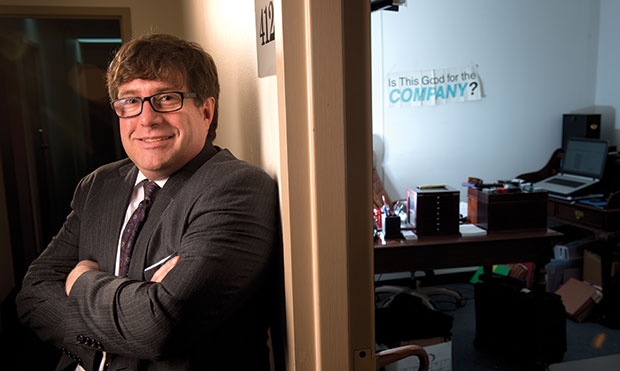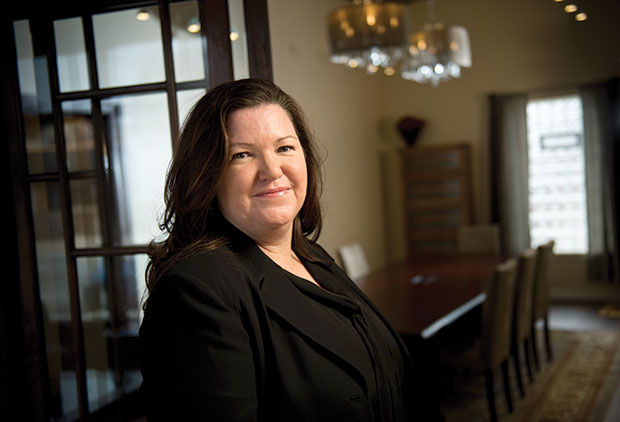The perks (and drawbacks) of being a solo practitioner
By: Rick Benedict//December 13, 2017//

Before deciding to hang out her own shingle, Kate Knowlton of Wauwatosa-based Knowlton Law Group spent several years practicing at small firms and non-profit groups. Her plunge into solo practice came in 2011, following a six-month break.
 “When I came back, it seemed like a natural fit to have my own hours and to run the show the way I needed to run it, in terms of the hours for my family,” Knowlton said.
“When I came back, it seemed like a natural fit to have my own hours and to run the show the way I needed to run it, in terms of the hours for my family,” Knowlton said.
When J.P. Fernandes, a lawyer out of Milwaukee, opened The Fernandes Law Firm ten years ago, it was for slightly different reasons.
“I wanted to take my financial future in my own hands and not be at the mercy of someone else for things like bonuses agreed to but not paid for and other matters like that,” he said.
Despite the differences, Fernandes has this in common with Knowlton: He decided to make the change after working for several years at large and medium-sized firms.
Both agreed that freedom is one of the biggest benefits of solo practice.
“It’s a 100 percent amazing life,” Knowlton said. “I’m my own boss. I get to choose my clients.”
According to the Wisconsin State Bar’s most recent count, solo practitioners like Knowlton and Fernandes make up about 11 percent of the 25,015 lawyers who are licensed to practice in Wisconsin. The figures are based on what lawyers report on their annual bar-dues statement.
Another advantage of solo practice is its malleability. Katherine Stewart, who started solo practice in 1997 after working for 15 years at a large firm in Rice Lake, spends half of her time running an estate-planning and trust-and-estate administration practice in Spooner. The other half she spends working as a family-court commissioner in both Washburn and Barron counties.
“The two work really well together,” she said.
All this is not to say solo practice is free of difficulties.
For Knowlton, who mainly practices family law, one of the hardest steps was to overcome the feeling that she was alone. Solo practitioners, unlike their colleagues at big firms, have no colleagues next door or down the hall to turn to for advice or assistance.
For that reason, Knowlton said, it’s important that solo practitioners find other lawyers they can bounce ideas off. A good way to build up a stable of advisers, she said, is to sign up for the State Bar of Wisconsin’s listservs. Stewart said she also will reach out to lawyers at her old firm.
Both cautioned that solo practitioners should be careful about whom they bounce ideas off of – the person turned to could easily end up on the other side of the case.
In addition to taking advantage of listservs and other resources available from the State Bar, Zeshan Usman of the Madison-based Usman Law Firm has started a monthly solo-practitioner roundtable. Usman said the events have given him an opportunity to observe solo practitioners struggling to maintain their practice and run a business at the same time. Many have a particularly tough time with billing and marketing, he said.
“It’s not just sitting at a desk with a boss feeding you files,” Usman said.
Fernandes agreed, saying that those tasks often take up time that could have instead become billable hours. Then there’s the need to find work.
The unrelenting pressure to bring in clients is one of the biggest reasons lawyers decide to give up on solo practice.
“As a solo, you eat what you kill because you can’t rely on other people to do the overflow work,” he said. “You’re always wondering, ‘Am I going to get this next client? Will they pay me?’”
Another risk of solo practice can be an increased chance that will you be investigated by the Office of Lawyer Regulation.

Keith Sellen, director of the state’s Office of Lawyer Regulation, said in an email that the OLR does not take practice size into account when tracking grievances filed against lawyers. Even so, Sellen said he gets the sense that solo practitioners and lawyers at small firms are more likely than their counterparts at large firms to have grievances filed against them or be disciplined.
One cause of this difference, he said, is likely a lack of supervision, resources and training at small practices.
Although Stewart agreed that solo practitioners who are not familiar with the rules of lawyer conduct might find themselves with no one to turn to for advice, she said her experience serving two terms on the OLR district gave her reason to believe that solo practices are not, in themselves, a source of trouble.
“Some of the cases that I saw going through the OLR district committee perhaps involved a disproportionate amount of solo practitioners, but I don’t think that had anything to do with them being solo practitioners,” Stewart said. “It had to do, for the most part with, perhaps, bad choices.”
Just like lawyers at big firms, solo practitioners are having to adapt to changes in the economy and advances in technology.
With computerized research systems coming down greatly in price, becoming free in some cases, big firms have lost some of the advantages they once had over solo practitioners.
Meanwhile, technology has given clients access to reams of information that had once been reserved for lawyers. The upshot, in many instances, has been more disagreements with clients about what the law actually is, said Knowlton.
Knowlton said technological change has brought both good and bad results. Clients can now make decisions with more confidence, even while exercising greater discretion.
“They don’t feel like they are coming to you to get the answer,” she said. “They come to you to most efficiently get the best answer for their case. You have to be more of the strategic planner.”
For Usman, the biggest changes have originated in the economy. He said it was largely necessity that led him to start a solo practice straight out of law school. He graduated during the recent recession, when jobs were scarce. Now, though, Usman is seeing more lawyers choosing to go solo simply because it seems to offer them the best career prospects.
“I think a lot of the bigger firms are having issues retaining clients and charging them what they used to charge and maintaining their crazy overhead …” he said.
“The people who are bringing in the business at the big law firms, they’re leaving and retaining a lot of the money and charging their clients less.”
Legal News
- Gov. Evers seeks applicants for Dane County Circuit Court
- Milwaukee man charged in dismemberment death pleads not guilty
- Democratic-led states lead ban on the book ban
- UW Madison Professor: America’s child care crisis is holding back moms without college degrees
- History made in Trump New York trial opening statements
- Prosecutor won’t bring charges against Wisconsin lawmaker over fundraising scheme
- Republican Wisconsin Senate candidate says he doesn’t oppose elderly people voting
- Vice President Harris to reveal final rules mandating minimum standards for nursing home staffing
- Election workers fear threats to their safety as November nears
- Former law enforcement praise state’s response brief in Steven Avery case
- Eric Toney announces re-election bid for Fond du Lac County District Attorney
- Former Wisconsin Democratic Rep. Peter Barca announces new bid for Congress
WLJ People
- Power 30 Personal Injury Attorneys – Russell Nicolet
- Power 30 Personal Injury Attorneys – Benjamin Nicolet
- Power 30 Personal Injury Attorneys – Dustin T. Woehl
- Power 30 Personal Injury Attorneys – Katherine Metzger
- Power 30 Personal Injury Attorneys – Joseph Ryan
- Power 30 Personal Injury Attorneys – James M. Ryan
- Power 30 Personal Injury Attorneys – Dana Wachs
- Power 30 Personal Injury Attorneys – Mark L. Thomsen
- Power 30 Personal Injury Attorneys – Matthew Lein
- Power 30 Personal Injury Attorneys – Jeffrey A. Pitman
- Power 30 Personal Injury Attorneys – William Pemberton
- Power 30 Personal Injury Attorneys – Howard S. Sicula











